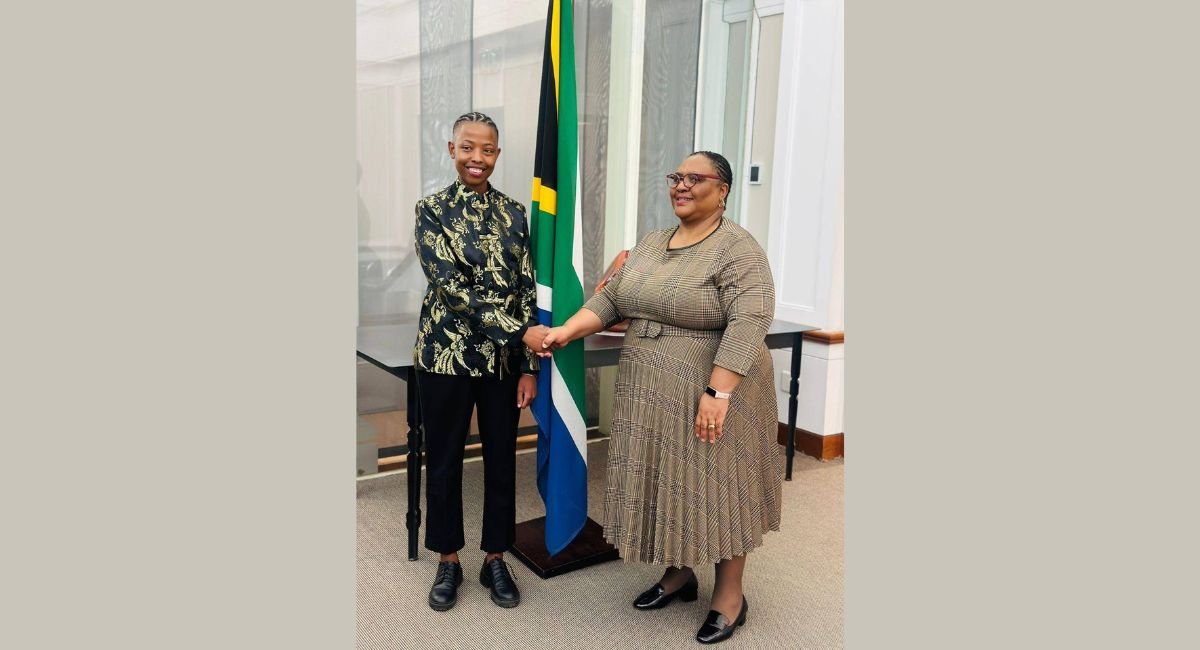Palomino Jama (L) was sworn in by South African National Assembly Speaker Thoko Didiza (R) on 17 June 2025.
Palomino Jama was sworn in on June 17 during International Pride Month in a positive step for LGBTQ+ representation in African politics.
by Beza Lealem
Palomino Jama, an out LGBTQ+ activist and South African feminist, was sworn in as a new member of parliament on June 17.
Jama commented on the occasion in a post on her Facebook page: “Thank you so much to you all my family, friends and comrades. I really appreciate the well wishes, they motivated me to really work hard and excel in my new responsibilities.”
Jama, a member of the African National Congress (ANC) party, joins other out LGBTQ+ legislators in the South African parliament including ministers Dean Macpherson, Dion George and Mmapaseka “Steve” Letsike.
Jama is said to be the second out Black South African lesbian MP, following ANC colleague Letsike who was sworn in last year. Letsike, an LGBTQ+ activist and former deputy to Cyril Ramaphosa before he became president, was preceded by other political trailblazers in the country. Lynne Brown, an out mixed-race lesbian was appointed cabinet minister by former president Jacob Zuma in 2014, and Democratic Alliance party member Zakhele Mbhele was elected as the first openly gay Black MP in the same year.
Although South Africa is the only African country that constitutionally upholds LGBTQ rights including same-sex marriage, its LGBTQ+ community still faces numerous challenges from elements of society.
Local LGBTQ+ organisation Embrace Diversity Movement hailed Jama’s inauguration as a positive step for the movement. “Palomino is a seasoned queer activist and dedicated community builder with a distinguished record of leadership and service… her deployment to parliament [and] her presence meaningfully [advance] youth and queer representation in public office,” the group said, according to US media Washington Blade.
The presence of LGBTQ+ people in the highest echelons of power is about more than just visibility and representation. It gives the community a voice at the table when issues are debated, empowering LGBTQ+ people to use political influence to ignite change through legislation, policymaking and other government actions that help shape public opinion.
The United Nations acknowledges even wider benefits. “The political representation of LGBTI+ persons in parliaments and their participation during elections is essential to improve human rights and to build stronger democracies,” wrote the United Nations Development Programme in a statement when the NGO released a report on the subject in 2023.
Out LGBTQ+ politicians have been making global strides in recent years even if representation on the African continent is still very low. At the beginning of 2018, a total of 326 openly LGBT representatives had been elected as national MPs in 48 countries since 1976, according to the LGBTQ Representation and Rights Research Initiative at the University of North Carolina at Chapel Hill in the US.
As Africa’s first out gay MP Zakhele Mbhele said more than a decade ago in an interview with MambaOnline, “one of the most damaging things about homophobia is its destructive effect on a young LGBT person’s self-esteem… having more openly gay achievers in society can counter that damage by giving young LGBT people role models to inspire them to build their self-confidence and work ambitiously to achieve their dreams.”

